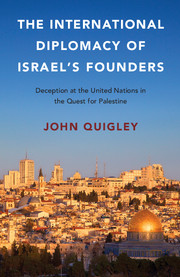 The International Diplomacy of Israel's Founders
The International Diplomacy of Israel's Founders Book contents
- Frontmatter
- Contents
- Preface
- A Note on United Nations Committees
- Abbreviations
- 1 A Public Relations Imperative
- 2 Promises, Promises
- 3 Pranks in Paris and Geneva
- 4 Courting the Commissar
- 5 Saving Europe's Jews – Our Way
- 6 Smoke and Mirrors at the YMCA
- 7 The Ship that Launched a Nation
- 8 Cocktails at the Consulate
- 9 Causing Chaos
- 10 Denying the Undeniable
- 11 A Peace-Loving State?
- 12 Joining the World with Fingers Crossed
- 13 Israel: 1, United Nations: 0
- 14 A Phantom Attack
- 15 Sabras in Sinai: Pardon My French
- 16 Suez Smoke-Screen
- 17 Mr. Nasser, Please Attack
- 18 Abba Eban's Finest Hour
- 19 Old Issues, New Lies
- 20 An Organization Turned Sinister
- 21 Prevarication Pays
- Notes
- Bibliography
- Index
4 - Courting the Commissar
Published online by Cambridge University Press: 05 January 2016
- Frontmatter
- Contents
- Preface
- A Note on United Nations Committees
- Abbreviations
- 1 A Public Relations Imperative
- 2 Promises, Promises
- 3 Pranks in Paris and Geneva
- 4 Courting the Commissar
- 5 Saving Europe's Jews – Our Way
- 6 Smoke and Mirrors at the YMCA
- 7 The Ship that Launched a Nation
- 8 Cocktails at the Consulate
- 9 Causing Chaos
- 10 Denying the Undeniable
- 11 A Peace-Loving State?
- 12 Joining the World with Fingers Crossed
- 13 Israel: 1, United Nations: 0
- 14 A Phantom Attack
- 15 Sabras in Sinai: Pardon My French
- 16 Suez Smoke-Screen
- 17 Mr. Nasser, Please Attack
- 18 Abba Eban's Finest Hour
- 19 Old Issues, New Lies
- 20 An Organization Turned Sinister
- 21 Prevarication Pays
- Notes
- Bibliography
- Index
Summary
During the years of World War II, the Zionist Organization gave attention to the international environment as it expected it to develop after the war. By then, Britain had taken a turn in its Palestine policy that did not sit well with the Zionist Organization. In May 1939, the British government decided that rather than working towards partition of Palestine into two states as recommended by the 1937 Peel Commission, it would instead limit Jewish migration into Palestine to a specific number per year. The Zionist Organization took that move as a repudiation of the Balfour Declaration. The bloom on the relationship between the Zionist Organization and Britain faded. At the same time, the Soviet Union was allied with the major Western powers against Germany, and the Soviet advances in industrialization in the 1930s were propelling the Soviet Union towards becoming a major actor at the international level. In particular, the Soviet Union might play a role on war and peace issues after an anticipated defeat of Germany.
The Soviet ambassador in London, a hub of activity for the Zionist Organization, was an erudite diplomat named Ivan Maiskii. In 1939, Moshe Shertok, who headed the Jewish Agency's Political Department, approached Maiskii and held a series of meetings to try to incline the Soviet government towards a pro-Zionist position. Shertok's effort produced no immediate result. It was an ambitious undertaking. The Soviet view of Zionism was distinctly negative. Jews had been the object of discrimination in tsarist Russia, and Zionism had been suppressed. The Bolsheviks promoted the assimilation of Jews in Russian society. Zionism went in the opposite direction from assimilation. Early Soviet policy on Zionism was hesitant. Zionist organizations were tolerated, but within a few years, Zionists were subjected to arrest and their activities thwarted. By the 1930s, Zionists were unable to organize, with many of their number imprisoned. So the Zionist Organization faced an uphill battle if it wanted the Soviet Union on its side.
In January 1941, Shertok's effort was resumed by Chaim Weizmann, then serving as President of the World Zionist Organization. Maiskii's notes of their encounter found their way into the Soviet archives. As Maiskii recorded, Weizmann adopted the approach of telling Maiskii that the Jews of Palestine were at odds with the British administration. The sub-text was that the Jews of Palestine would find the Soviet government more compatible.
- Type
- Chapter
- Information
- The International Diplomacy of Israel's FoundersDeception at the United Nations in the Quest for Palestine, pp. 31 - 38Publisher: Cambridge University PressPrint publication year: 2016


